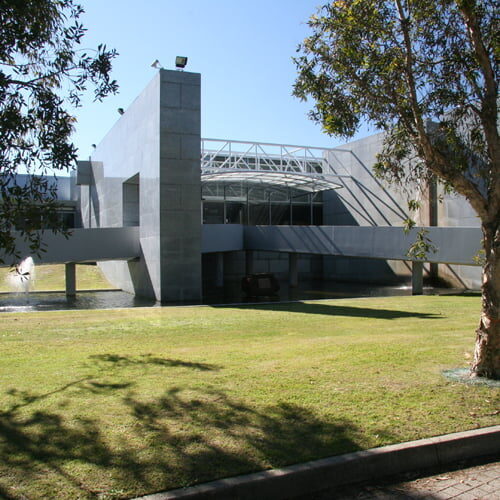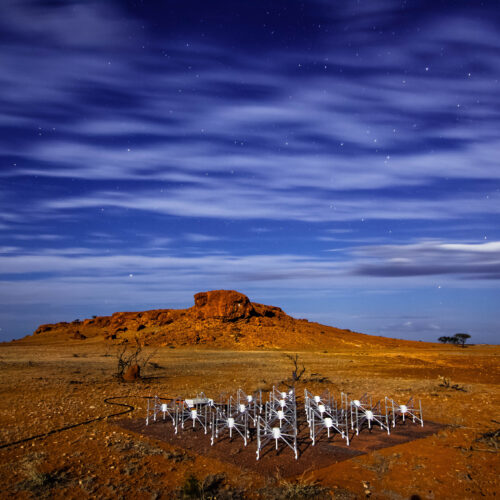By attracting a diverse team of world-class researchers and collaborating with other leading institutions, ICRAR has grown into an internationally-renowned centre of astronomy research in just five years. We currently employ over 100 staff and are training over 80 graduate students across our two nodes (Curtin and UWA).
Our research activities are divided into three overarching programs: Science; Technology and Engineering; and Data Intensive Astronomy.Much of ICRAR’s work revolves around science associated with the Square Kilometre Array and its precursors.
Science
ICRAR’s science program is based on the instinctive human endeavour to understand more about the nature of everything around us. Making sense of the information from new generation telescopes such as the Australian Square Kilometre Array Pathfinder (ASKAP), Murchison Widefield Array (MWA) and Square Kilometre Array (SKA) will vastly expand our view and understanding of the Universe.
Learn more about our Science program
Engineering
ICRAR’s engineering program is supported by team members with specialisations in antenna design, digital signal processing, electromagnetic compatibility and radio-frequency systems. The program is integral to ICRAR’s aim to participate in the end-to-end design, construction, data processing and science extraction for the SKA. Our broad and world-class capabilities in both radio astronomy and engineering have been demonstrated through the successful delivery of the Murchison Widefield Array (MWA) and SKA verification systems. These engineering feats are now guiding the SKA’s low-frequency design.
LEARN MORE ABOUT OUR ENGINEERING PROGRAM
Data Intensive Astronomy
To secure and support the SKA, it was critical for Western Australia to establish world-class Information and Communication Technology capabilities. Prior to 2014, ICRAR’s ICT program focused on developing core capabilities through development of a Data Intensive Research Pathfinder, Conceptual Design Studies for the SKA and High Performance Computing (supercomputing). ICRAR’s ICT program evolved into the Data Intensive Astronomy program in 2015, focused on developing the data management and processing infrastructure for the SKA.
The current DIA program has two high level core roles. The first one is to design and implement data flow and data processing management organisations and systems to enable astronomical data analysis on massive, SKA scale data sets. This is more generic than just working towards the SKA as it also includes precursor, pathfinder and other data sets, like from ASKAP, JVLA, ATCA and MWA. This role is mostly technical in nature, but, due to the extreme data volumes, also includes research in computer science, software engineering and machine learning.
The second role is to support current and future science projects within the ICRAR Science Program with a focus on large-scale survey projects posing similar problems as the anticipated SKA key science projects and aligned with the decadal plan for Australian astronomy.
Learn more about our Data Intensive Astronomy Program
Translation and Impact
ICRAR has a strong track record in research translation and impact and is committed to engaging with partners to share our skills, knowledge and expertise for mutual benefit.
Our researchers engage with industry, government, non-government organisations, communities and community organisations to translate our research beyond academia to benefit society.
ICRAR actively seeks collaborative opportunities to leverage emerging capabilities from other domains, and to apply our skills, knowledge and tools outside of radio astronomy. .
By collaborating across disciplines and industry sectors, we can help boost capability, develop new products, grow businesses and create jobs.
We engage with stakeholders and end-users through a range of mechanisms, including:
- Partnerships with industry
- Collaborative grant applications
- High-quality training
- Provision of specialist services
- Establishment of networks and collaborations
- School programs
- Community events
ICRAR aims to impact Western Australia’s economy, society, environment and culture, beyond our contribution to academia.
Our research in data intensive computing, engineering and technology supports core outcomes for the state in radio astronomy and the SKA.
ICRAR’s impact also extends to a diverse range of areas beyond astronomy, including:
- Signal and data transport
- Robotics
- Applied machine learning
- Data management and processing
- Passive radar
- Satellite deployment
- STEM education


